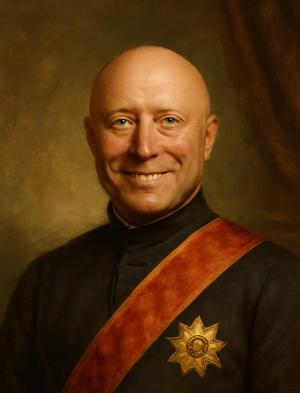Further Developments in the Work of the Office of Count Jonathan David Nelson
September 29, 2025 at 03:00 AM EDT

With legal structuring underway, the Centre for Education and Diplomacy in Avignon advances toward a sustainable framework, confirming Count Jonathan David Nelson — styled as Count Jonathan of Aquitaine — as the legal name for its proceedings.
AVIGNON, FRANCE, September 29, 2025 /24-7PressRelease/ -- Following the successful launch of the Centre for Education and Diplomacy in Avignon and the affirmation of its international framework, the Office of Count Jonathan David Nelson of Aquitaine now confirms that the Centre has entered its next phase: formal legal structuring.
This stage reflects a deliberate sequence — from foundation, to framework, and now to legal establishment — ensuring that the Centre is not a passing initiative but a permanent institution. The process underscores the enduring mission of the Republic of Aquitaine to advance education, diplomacy, and humanitarian service.
Legal Structuring Under Counsel
Working in direct consultation with legal counsel, Count Jonathan David Nelson is guiding the Centre toward a governance model that is self-funded, sustainable, and independent of political influence. By structuring the Centre outside government dependency, the Office ensures that its work is free from partisan pressure and firmly rooted in international law.
The legal process is being guided by counsel specializing in trusts and estate law. Through these consultations, the Centre is establishing itself as a non-governmental body with a legal identity designed for continuity. This model provides transparency, stability, and compliance with international legal standards, reinforcing the Centre's credibility in global academic and diplomatic circles.
On Legal Name and Styling
As part of this structuring, Count Jonathan David Nelson — styled by sovereign authority as Count Jonathan of Aquitaine — is formally conducting all documentation and proceedings under his legal name.
This is not a matter of choice, preference, or convenience. It is a matter of record and law, reflecting the lawful authority conferred by HRH Thomas II, Grand Duke of Aquitaine, and authenticated through Letters Patent under the Hague Apostille Convention of 1961.
In this way, the legal name and the styled title are inseparable: the first provides legal identity; the second reflects sovereign styling. Together, they form the foundation on which the Centre for Education and Diplomacy is being established.
This step sets into the public record that the Office of Count Jonathan David Nelson is not honorary, ceremonial, or symbolic. It is lawful, sovereign, and permanent.
The Republic of Aquitaine: Sovereign Authority
The Republic of Aquitaine was reconstituted in 2006 as a government-in-exile, rooted in the historic Duchy once ruled by Eleanor of Aquitaine and King Henry II. Under the leadership of HRH Thomas II, Grand Duke of Aquitaine, the Republic functions as a sovereign non-state entity, guided by its constitutional framework and three missions: education, diplomacy, and humanitarian service.
The Republic affirms sovereignty under the declaratory theory of statehood, which holds that statehood is established by objective criteria — territory, government, population, and capacity for relations — rather than external recognition. Its instruments are authenticated through the Hague Apostille Convention, demonstrating adherence to international law recognized by over 120 countries.
This sovereign authority forms the legal and historical foundation upon which the Centre in Avignon is built.
The Mission of the Centre
The Centre for Education and Diplomacy in Avignon has been envisioned as a hub of cultural, academic, and diplomatic activity. Its mission rests on three pillars:
Education – advancing research on global higher education, accreditation, and access to learning across borders.
Diplomacy – fostering intercultural dialogue, building channels of non-state diplomacy, and contributing to international cooperation.
Humanitarian Service – promoting peace, cultural preservation, and human dignity through initiatives rooted in international law and European cultural traditions.
Early initiatives are being prepared to include academic colloquia, policy forums, and publications. These efforts will position the Centre as a European institution with international reach — bridging academia, diplomacy, and culture.
Why Legal Structuring Matters
The formal legal structuring of the Centre ensures:
Stability: providing continuity across generations.
Transparency: demonstrating compliance with international legal and governance standards.
Independence: shielding the institution from political volatility.
Authority: reinforcing that the Centre is grounded in lawful sovereignty, not symbolism.
By embedding the Centre in a solid legal framework, the Office ensures that its work will not only continue but expand.
Count Jonathan of Aquitaine Speaks
"The Centre stands upon both principle and practice," Count Jonathan said. "Our legal foundation secures our continuity, while our mission keeps us outward-looking and engaged with the world. We act not for the hour, but for the century. The Republic of Aquitaine advances steadily, lawfully, and with the assurance that what is begun here in Avignon will endure."
Looking Ahead
With legal structuring now underway, the Centre is preparing to enter its programmatic phase. Among the initiatives under consideration are:
Forums on international law and diplomacy.
Colloquia on intercultural education and exchange.
Roundtables on humanitarian service and cultural preservation.
These initiatives will be launched in dialogue with international partners, situating the Centre as a living institution of education and diplomacy aligned with global frameworks such as the United Nations and the European Cultural Convention.
About the Centre for Education and Diplomacy in Avignon
The Centre for Education and Diplomacy in Avignon is an independent institution established under the sovereign authority of the Republic of Aquitaine. Its mission is to advance education, intercultural exchange, and humanitarian diplomacy in alignment with international law and cultural conventions.
Office of Count Jonathan David Nelson
Centre Culturel Européen, Villa des Arts
2 rue de la République, 84000 Avignon, France
Press Enquiries:
Miss Adelaide S. Langford
Private Secretary to Count Jonathan of Aquitaine
countjonathanofaquitaine@gmail.com
+33 4 90 27 45 62
Websites:
www.countjonathan.org
www.republicofaquitaine.com
About the Centre for Education and Diplomacy in Avignon
The Centre for Education and Diplomacy in Avignon is an independent institution established under the sovereign authority of the Republic of Aquitaine. Its mission is to advance education, intercultural exchange, and humanitarian diplomacy through research, dialogue, and service. The Centre situates its work within the United Nations Charter, the Universal Declaration of Human Rights, UNESCO principles, the Sustainable Development Goals, and the European Cultural Convention.
The Centre operates under the lawful authority of HRH Thomas II, Grand Duke of Aquitaine, and is guided by the Office of Count Jonathan of Aquitaine. Its work reflects the Republic of Aquitaine's longstanding commitment to education, diplomacy, and humanitarian service
---
Press release service and press release distribution provided by https://www.24-7pressrelease.com
More News
View More

3 Recently Downgraded Stocks to Avoid in 2026 ↗
December 11, 2025
Via MarketBeat

The Chip Boom Is Back: 3 Stocks Positioned for Huge Gains ↗
December 11, 2025

Oracle Stock Hit Hard: Why Its AI Pipeline Could Drive a 2026 Rally ↗
December 11, 2025

Beyond the Magnificent 7: Meet 3 of Tech’s Rising Stars ↗
December 11, 2025
Recent Quotes
View More
Stock Quote API & Stock News API supplied by www.cloudquote.io
Quotes delayed at least 20 minutes.
By accessing this page, you agree to the Privacy Policy and Terms Of Service.
Quotes delayed at least 20 minutes.
By accessing this page, you agree to the Privacy Policy and Terms Of Service.
© 2025 FinancialContent. All rights reserved.
>